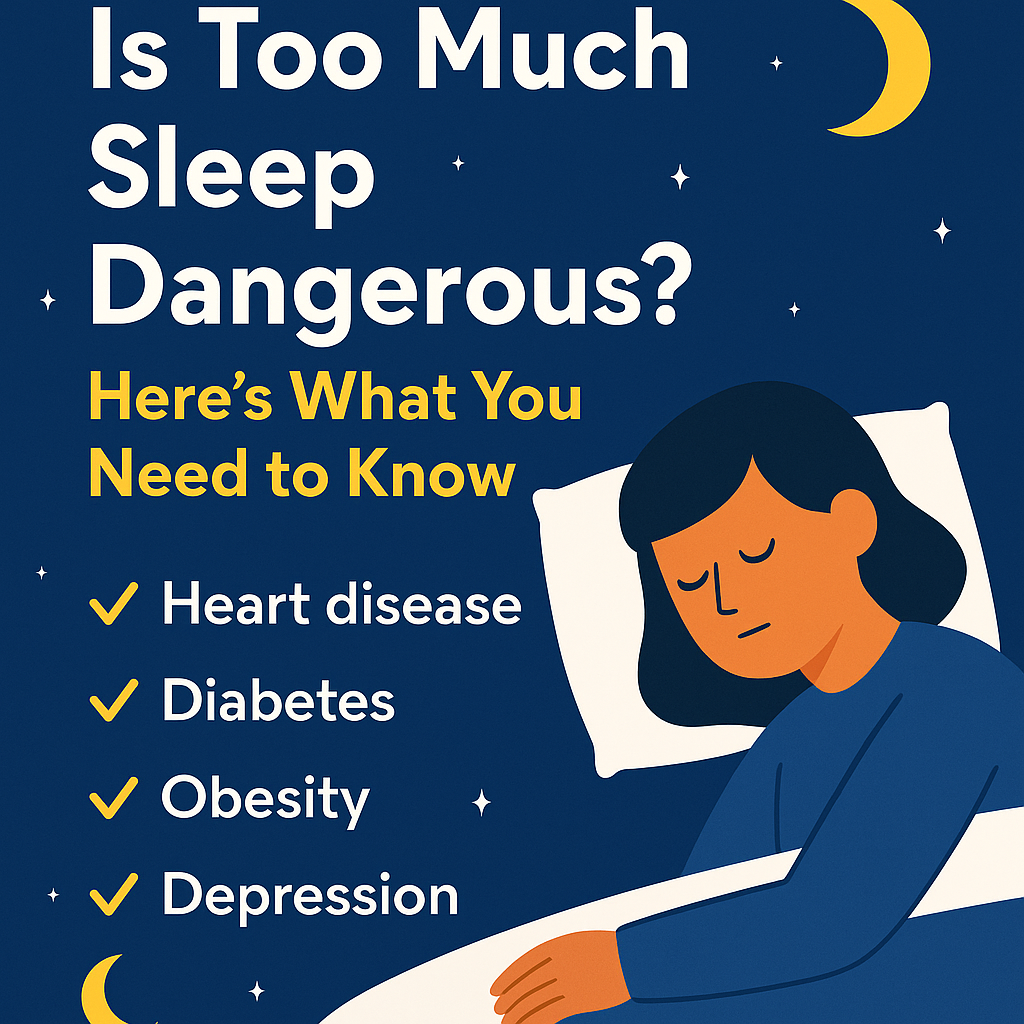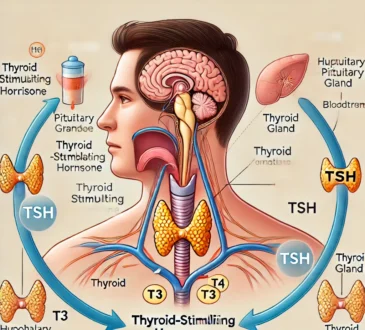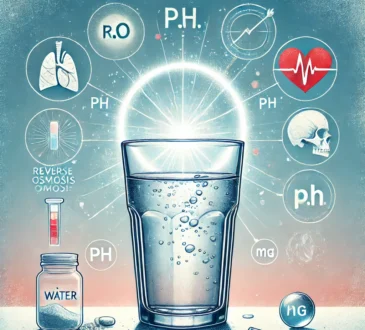Introduction
Sleep is universally recognized as one of the most crucial aspects of human health, necessary for physical recovery, mental clarity, and emotional balance. However, what often escapes public awareness is that too much sleep—just like too little—can be harmful. The popular mantra “more is better” doesn’t always apply when it comes to sleep. In fact, oversleeping has been linked to various health issues, including heart problems, diabetes, depression, cognitive decline, and even early mortality.
This article explores in detail how excessive sleep can be dangerous, why it occurs, and what you can do to maintain healthy sleep habits.
Section 1: What Is Oversleeping?
1.1 Definition
Oversleeping, or hypersomnia, refers to excessive sleep duration that significantly exceeds the recommended 7–9 hours per night for most adults. While occasional longer sleep durations may not be harmful—especially after periods of sleep deprivation—consistent oversleeping can have negative effects.
1.2 Recommended Sleep Durations (According to Age)
| Age Group | Recommended Sleep Duration |
|---|---|
| Newborns (0–3 mo) | 14–17 hours |
| Infants (4–11 mo) | 12–15 hours |
| Toddlers (1–2 yrs) | 11–14 hours |
| Preschool (3–5 yrs) | 10–13 hours |
| School Age (6–13) | 9–11 hours |
| Teenagers (14–17) | 8–10 hours |
| Adults (18–64) | 7–9 hours |
| Older Adults (65+) | 7–8 hours |
Sleeping more than 9 hours regularly as an adult may be considered oversleeping.
Section 2: Causes of Oversleeping
2.1 Lifestyle and Behavioral Factors
-
Lack of physical activity: Sedentary lifestyles often disrupt the natural circadian rhythm, making the body crave more rest.
-
Poor diet: High sugar and carb intake can lead to sluggishness and increased fatigue.
-
Stress and mental health: Anxiety and depression can alter sleep cycles, sometimes resulting in oversleeping.
-
Alcohol and drug use: Substances can disrupt REM cycles and cause increased sleep duration.
2.2 Medical Conditions
-
Sleep Apnea: Causes disrupted breathing, leading to poor-quality sleep and excessive daytime sleepiness.
-
Narcolepsy: A neurological disorder that can cause overwhelming daytime drowsiness.
-
Hypothyroidism: A slower metabolism often leads to fatigue and a need for more sleep.
-
Chronic Fatigue Syndrome (CFS): Characterized by persistent tiredness not improved by rest.
-
Restless Leg Syndrome (RLS): Disrupts sleep, often causing people to stay in bed longer.
-
Depression: A common symptom is hypersomnia, especially in atypical depression.
Thyroid-Stimulating Hormone (TSH): Functions, Disorders, Testing, and Treatment
Section 3: Health Risks Associated with Too Much Sleep
3.1 Cardiovascular Disease
Studies have shown a link between long sleep durations and increased risk of heart disease. Oversleeping is associated with:
-
Higher incidence of heart attacks
-
Irregular heart rhythms
-
Increased arterial inflammation
A 2018 study published in the Journal of the American Heart Association found that individuals who slept more than 9 hours a night had a 33% higher risk of developing heart disease.
3.2 Diabetes
Excessive sleep is associated with impaired glucose tolerance and insulin resistance. Those who sleep more than 9 hours regularly are:
-
More prone to Type 2 diabetes
-
Likely to develop metabolic syndrome
3.3 Obesity
Oversleeping contributes to weight gain through:
-
Reduced physical activity
-
Hormonal imbalances (such as leptin and ghrelin)
-
Increased appetite and cravings
3.4 Mental Health Disorders
-
Depression and anxiety can be both a cause and effect of oversleeping.
-
It disrupts circadian rhythms, which worsens mood disorders.
-
Oversleeping also contributes to low self-esteem, lack of motivation, and social withdrawal.
3.5 Cognitive Decline and Dementia
-
Long sleep duration has been associated with memory problems, slower brain function, and Alzheimer’s disease.
-
A Harvard study found that women who slept more than 9 hours had worse cognitive performance than those sleeping 7–8 hours.
3.6 Headaches
-
Oversleeping can cause tension headaches due to effects on neurotransmitters like serotonin.
-
Irregular sleep schedules can disturb the body’s natural rhythm, triggering migraines.
3.7 Mortality Risk
Multiple studies have confirmed that individuals who sleep excessively have a higher risk of death, regardless of age, gender, or activity level.
Section 4: Psychological Effects of Oversleeping
4.1 Mood Disturbances
Oversleeping can leave people feeling:
-
Groggy or foggy-minded
-
Emotionally drained
-
More irritable or anxious
4.2 Social Isolation
Oversleeping reduces the time available for:
-
Social interaction
-
Daily responsibilities
-
Self-care and hobbies
This withdrawal can feed into a cycle of loneliness and depression.
4.3 Productivity Loss
People who oversleep tend to:
-
Miss work or school more often
-
Exhibit reduced cognitive performance
-
Struggle with focus, memory, and creativity
Section 5: Biological Mechanisms Behind Oversleeping and Its Impact
5.1 Circadian Rhythm Disruption
-
The body runs on a 24-hour clock influenced by light and dark.
-
Oversleeping confuses this rhythm, disrupting:
-
Hormonal release (melatonin, cortisol)
-
Sleep-wake cycles
-
Digestion and metabolism
-
5.2 Neurotransmitter Imbalance
Oversleeping affects brain chemicals:
-
Serotonin and dopamine levels become erratic.
-
This imbalance can lead to mood swings, low energy, and anxiety.
5.3 Inflammatory Markers
Chronic oversleeping raises:
-
C-reactive protein (CRP)
-
Interleukin-6 (IL-6)
These contribute to systemic inflammation, heart disease, and cognitive decline.
Section 6: The Vicious Cycle: Oversleeping and Fatigue
Contrary to what you might expect, sleeping more can make you feel more tired. This is due to:
-
Disrupted sleep architecture (more light sleep, less deep sleep)
-
Misalignment of sleep phases
-
Reduced daily exposure to sunlight, affecting melatonin regulation
The Ultimate History of Football: From Ancient Origins to Global Phenomenon
Section 7: How to Know if You’re Oversleeping
7.1 Signs You Might Be Sleeping Too Much
-
Consistently needing more than 9 hours of sleep
-
Waking up tired even after long sleep
-
Trouble falling asleep at night
-
Daytime fatigue despite long night sleep
-
Frequent headaches or back pain
7.2 Self-Monitoring Tools
-
Sleep diaries
-
Wearable devices (e.g., Fitbit, Apple Watch)
-
Sleep-tracking apps like Sleep Cycle or Pillow
Section 8: How to Fix Oversleeping
8.1 Create a Sleep Schedule
-
Sleep and wake up at the same time daily
-
Avoid naps longer than 20–30 minutes
8.2 Get More Morning Light
-
Expose yourself to natural sunlight early in the day
-
It helps reset your biological clock
8.3 Improve Sleep Quality, Not Quantity
-
Make your bedroom cool, dark, and quiet
-
Avoid caffeine and screens before bed
-
Practice relaxation techniques like deep breathing or meditation
8.4 Increase Physical Activity
-
Daily exercise boosts energy levels and reduces the urge to oversleep
8.5 Seek Medical Help
If you suspect an underlying condition like:
-
Depression
-
Sleep apnea
-
Hypothyroidism
Consult a sleep specialist or physician.
Section 9: When Is More Sleep Okay?
-
After sleep deprivation (recovery sleep)
-
During illness or infection
-
During pregnancy
-
Adolescence and growth spurts
Occasional longer sleep is not dangerous. The key concern is chronic oversleeping.
Conclusion
While society often focuses on the dangers of sleep deprivation, oversleeping deserves equal attention. The health risks associated with prolonged sleep—including heart disease, obesity, cognitive decline, and increased mortality—underscore the importance of balanced sleep habits.
Sleep is not just about duration but also quality and consistency. To protect your physical and mental well-being, prioritize good sleep hygiene, monitor your habits, and seek help when needed. The sweet spot for sleep is not “as much as possible” but just the right amount your body needs to function optimally.






